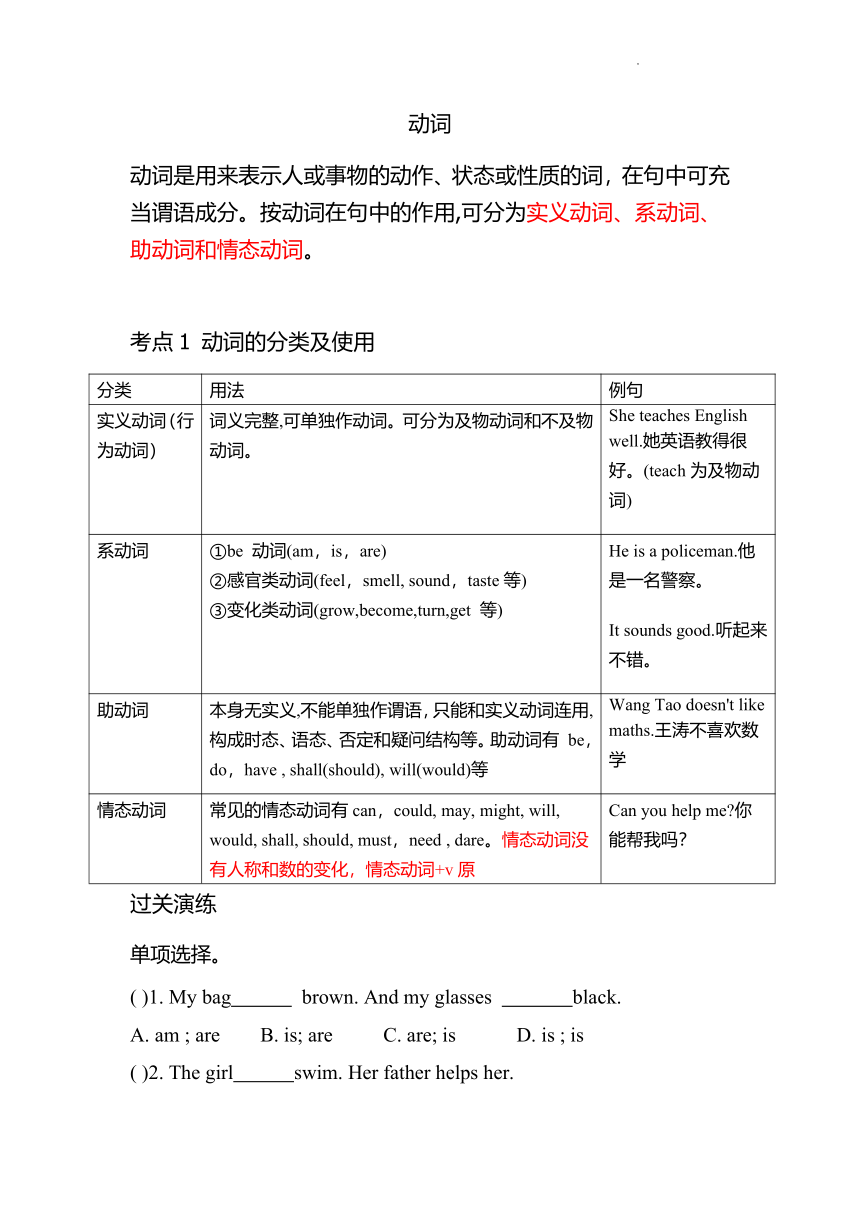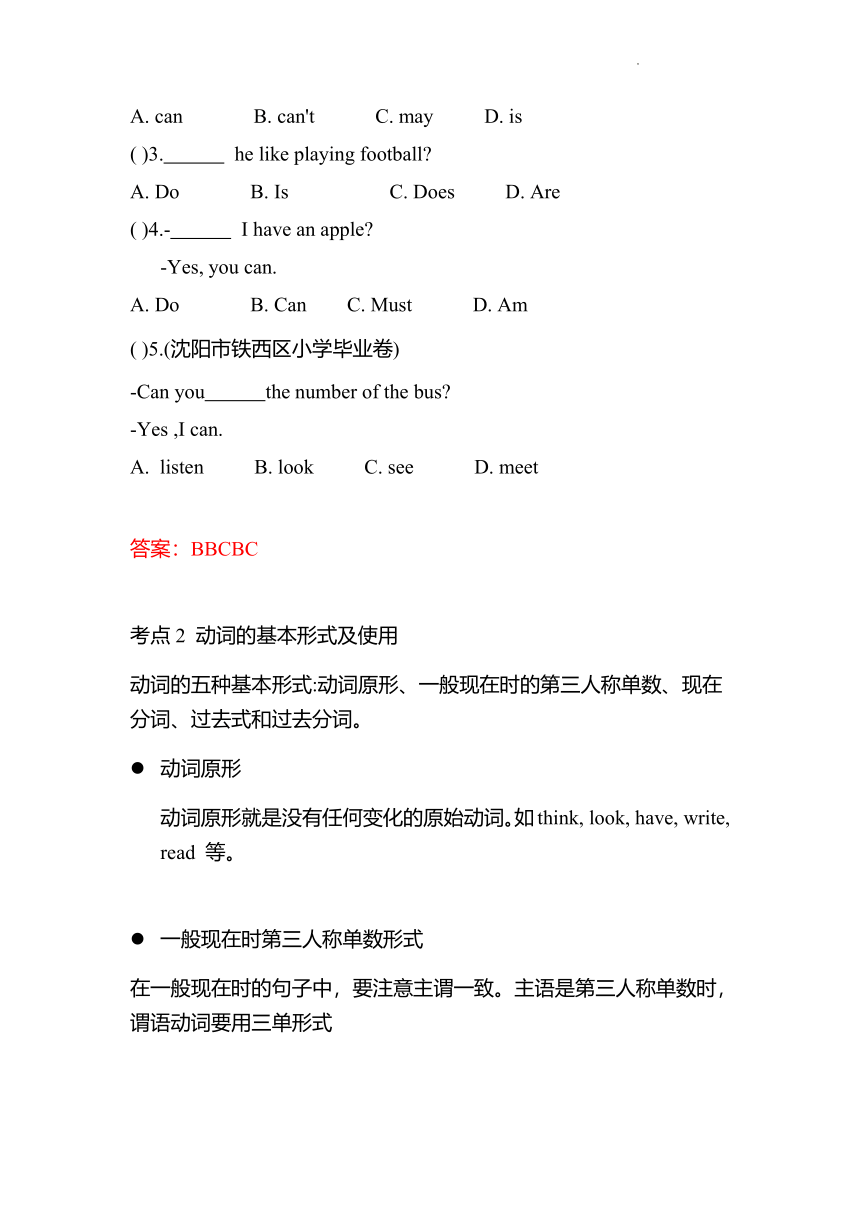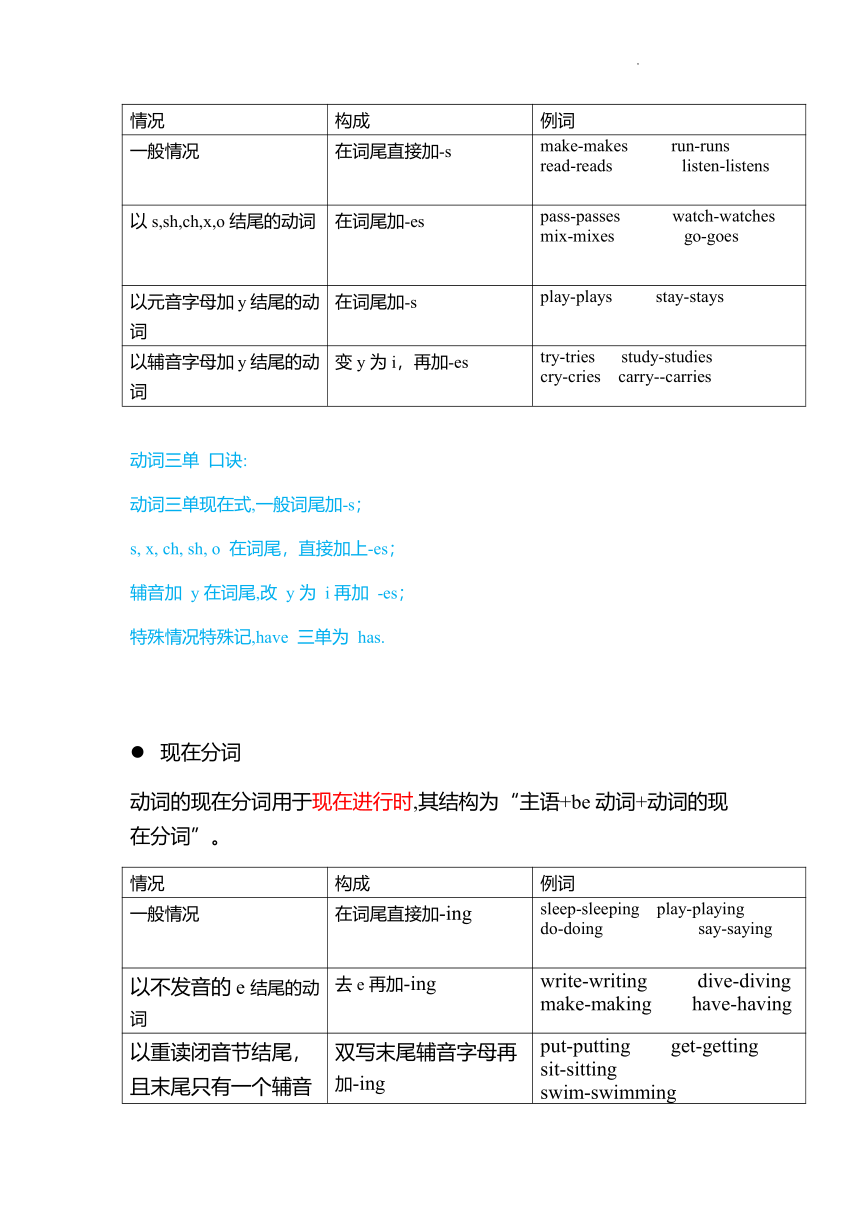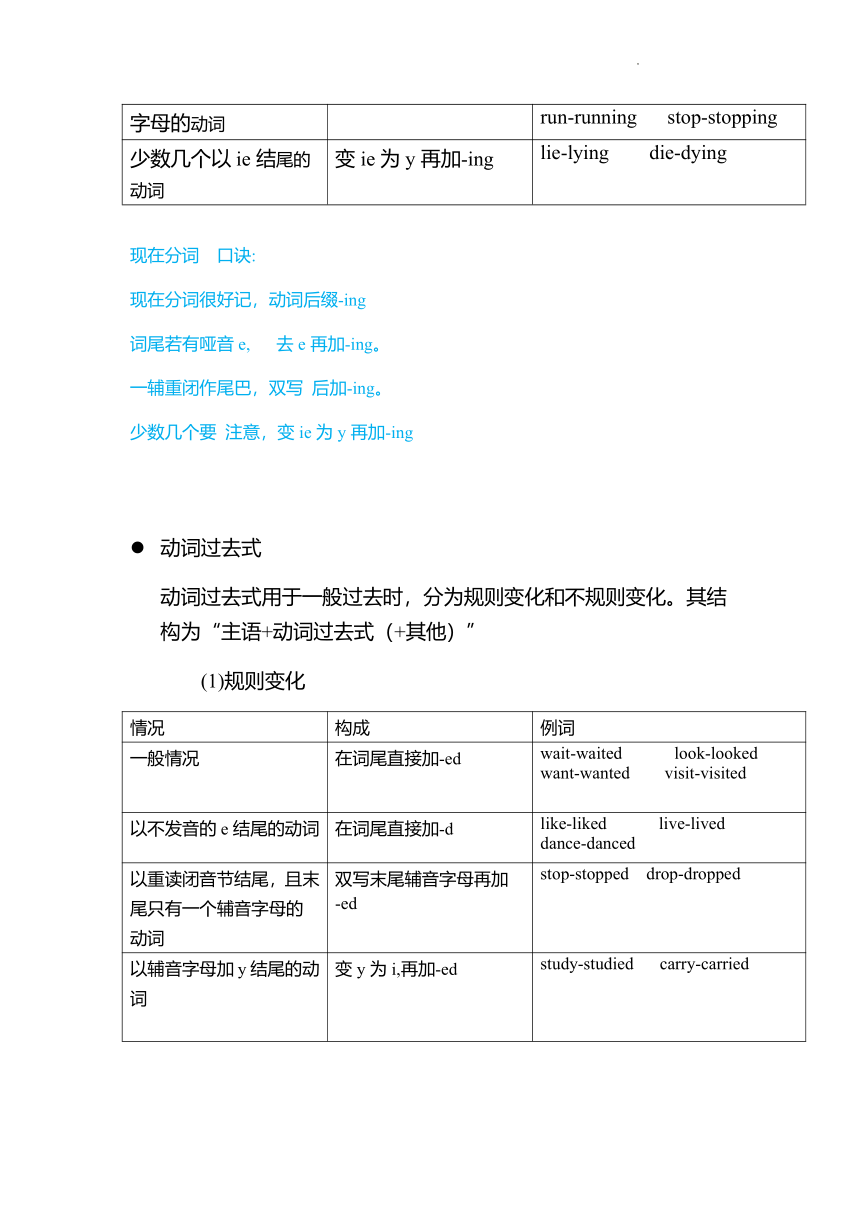2022年中考英语语法复习讲义动词(word版,含答案)
文档属性
| 名称 | 2022年中考英语语法复习讲义动词(word版,含答案) |  | |
| 格式 | docx | ||
| 文件大小 | 41.4KB | ||
| 资源类型 | 教案 | ||
| 版本资源 | 通用版 | ||
| 科目 | 英语 | ||
| 更新时间 | 2022-05-08 20:35:55 | ||
图片预览




文档简介
动词
动词是用来表示人或事物的动作、状态或性质的词,在句中可充当谓语成分。按动词在句中的作用,可分为实义动词、系动词、助动词和情态动词。
考点1 动词的分类及使用
分类 用法 例句
实义动词(行为动词) 词义完整,可单独作动词。可分为及物动词和不及物动词。 She teaches English well.她英语教得很好。(teach为及物动词)
系动词 ①be 动词(am,is,are) ②感官类动词(feel,smell, sound,taste等) ③变化类动词(grow,become,turn,get 等) He is a policeman.他是一名警察。 It sounds good.听起来不错。
助动词 本身无实义,不能单独作谓语,只能和实义动词连用,构成时态、语态、否定和疑问结构等。助动词有 be,do,have , shall(should), will(would)等 Wang Tao doesn't like maths.王涛不喜欢数学
情态动词 常见的情态动词有can,could, may, might, will, would, shall, should, must,need , dare。情态动词没有人称和数的变化,情态动词+v原 Can you help me 你能帮我吗?
过关演练
单项选择。
( )1. My bag brown. And my glasses black.
A. am ; are B. is; are C. are; is D. is ; is
( )2. The girl swim. Her father helps her.
A. can B. can't C. may D. is
( )3. he like playing football
A. Do B. Is C. Does D. Are
( )4.- I have an apple
-Yes, you can.
A. Do B. Can C. Must D. Am
( )5.(沈阳市铁西区小学毕业卷)
-Can you the number of the bus
-Yes ,I can.
listen B. look C. see D. meet
答案:BBCBC
考点2 动词的基本形式及使用
动词的五种基本形式:动词原形、一般现在时的第三人称单数、现在分词、过去式和过去分词。
动词原形
动词原形就是没有任何变化的原始动词。如think, look, have, write, read 等。
一般现在时第三人称单数形式
在一般现在时的句子中,要注意主谓一致。主语是第三人称单数时,谓语动词要用三单形式
情况 构成 例词
一般情况 在词尾直接加-s make-makes run-runs read-reads listen-listens
以s,sh,ch,x,o结尾的动词 在词尾加-es pass-passes watch-watches mix-mixes go-goes
以元音字母加y结尾的动词 在词尾加-s play-plays stay-stays
以辅音字母加y结尾的动词 变y为i,再加-es try-tries study-studies cry-cries carry--carries
动词三单 口诀:
动词三单现在式,一般词尾加-s;
s, x, ch, sh, o 在词尾,直接加上-es;
辅音加 y在词尾,改 y为 i再加 -es;
特殊情况特殊记,have 三单为 has.
现在分词
动词的现在分词用于现在进行时,其结构为“主语+be动词+动词的现在分词”。
情况 构成 例词
一般情况 在词尾直接加-ing sleep-sleeping play-playing do-doing say-saying
以不发音的e结尾的动词 去e再加-ing write-writing dive-diving make-making have-having
以重读闭音节结尾,且末尾只有一个辅音字母的动词 双写末尾辅音字母再加-ing put-putting get-getting sit-sitting swim-swimming run-running stop-stopping
少数几个以ie结尾的动词 变ie为y再加-ing lie-lying die-dying
现在分词 口诀:
现在分词很好记,动词后缀-ing
词尾若有哑音e, 去e再加-ing。
一辅重闭作尾巴,双写 后加-ing。
少数几个要 注意,变ie为y再加-ing
动词过去式
动词过去式用于一般过去时,分为规则变化和不规则变化。其结构为“主语+动词过去式(+其他)”
(1)规则变化
情况 构成 例词
一般情况 在词尾直接加-ed wait-waited look-looked want-wanted visit-visited
以不发音的e结尾的动词 在词尾直接加-d like-liked live-lived dance-danced
以重读闭音节结尾,且末尾只有一个辅音字母的动词 双写末尾辅音字母再加-ed stop-stopped drop-dropped
以辅音字母加y结尾的动词 变y为i,再加-ed study-studied carry-carried
动词的过去式 口诀:
过去式构成有规律,一般词尾加-ed
如果词尾有个e,只要直接加上-d。
结尾若是“辅音+y”,变y为i加-ed。
一辅重闭作尾巴,双写之后加-ed。
过去式不规则变化,需特殊记。
不规则变化
不定式 过去式 不定式 过去式
be (am, is, are) was, were let let
become became lose lost
begin began make made
bring brought meet met
buy bought put put
can could read read
come came run ran
cut cut say said
do did see saw
draw drew sell sold
drink drank send sent
drive drove shall should
eat ate sing sang
fall fell sit sat
feel felt sleep slept
find found speak spoke
fly flew stand stood
get got swim swam
give gave take took
go went teach taught
have (has) had tell told
hear heard think thought
hurt hurt wake woke
keep kept wear wore
know knew will would
learn learnt , learned win won
leave left write wrote
例题 按要求写词。
swim(现在分词形式)
2.run(过去式)
3.did(原形)
4.teach(第三人称单数形式)
答案:1.swimming 2.ran 3.do 4.teaches
过关训练
一、按要求写单词。
1.写出下列动词的现在分词。
ride swim dance
die answer stop
答案:1.riding 2. swimming 3.dancing 4.dying 5.answering 6.stopping
2.写出下列动词的第三人称单数形式。
do have study
like watch play
答案:does has studies likes watches plays
3.写出下列动词的过去式。
go stop are
can carry clean
答案:went stopped were could carried cleaned
二、单项选择。
( )1.Ann the piano well. She it now.
A.play;is playing B.plays;is playing C. plays;plays
( )2.I____ a teddy bear and Ken a toy car.
A.have;have B.has;has C. have;has
( )3.Grandpa’s favourite food fish.Grandma often cooks it for him.
A.is B.are C.am
( )4.Miss Lin often stories to her students in class.
A.says B. speaks C. tells
( )5. Lily's grandpa a newspaper yesterday
A.Does;read B.Did; readed C.Did;read
( )6.He often to the cinema,but he didn’t there yesterday.
go ; went B. goes;goes C. goes; go
答案:BCACCC
三、用所给词的适当形式填空。
1.Let's (eat) some bread for breakfast.
2. You should _( make) the bed by yourself.
3. John's family are _(have) dinner now.
4. Shall we go_ _(swim) now
5. We__(take) many photos in the park last Saturday.
答案:1.eat 2. make 3.having 4.swimming 5. took
四、按要求完成句子。
1. You shouldn't eat in the library.(改为祈使句)
2.His dad often drives a car to work.(改为一般疑问句)
3. It's time for lunch.(同义句转换)
4. Sarah plays sports every morning.(用 yesterday 替换 every morning 改写句子)
5.going,take, Mike, is, month, a, trip,to,next(.)(连词成句)
答案:
Don't eat in the library.
Does his dad often drive a car to work
3.It's time to have lunch.
4.Sarah played sports yesterday.
5.Mike is going to take a trip next month.
动词是用来表示人或事物的动作、状态或性质的词,在句中可充当谓语成分。按动词在句中的作用,可分为实义动词、系动词、助动词和情态动词。
考点1 动词的分类及使用
分类 用法 例句
实义动词(行为动词) 词义完整,可单独作动词。可分为及物动词和不及物动词。 She teaches English well.她英语教得很好。(teach为及物动词)
系动词 ①be 动词(am,is,are) ②感官类动词(feel,smell, sound,taste等) ③变化类动词(grow,become,turn,get 等) He is a policeman.他是一名警察。 It sounds good.听起来不错。
助动词 本身无实义,不能单独作谓语,只能和实义动词连用,构成时态、语态、否定和疑问结构等。助动词有 be,do,have , shall(should), will(would)等 Wang Tao doesn't like maths.王涛不喜欢数学
情态动词 常见的情态动词有can,could, may, might, will, would, shall, should, must,need , dare。情态动词没有人称和数的变化,情态动词+v原 Can you help me 你能帮我吗?
过关演练
单项选择。
( )1. My bag brown. And my glasses black.
A. am ; are B. is; are C. are; is D. is ; is
( )2. The girl swim. Her father helps her.
A. can B. can't C. may D. is
( )3. he like playing football
A. Do B. Is C. Does D. Are
( )4.- I have an apple
-Yes, you can.
A. Do B. Can C. Must D. Am
( )5.(沈阳市铁西区小学毕业卷)
-Can you the number of the bus
-Yes ,I can.
listen B. look C. see D. meet
答案:BBCBC
考点2 动词的基本形式及使用
动词的五种基本形式:动词原形、一般现在时的第三人称单数、现在分词、过去式和过去分词。
动词原形
动词原形就是没有任何变化的原始动词。如think, look, have, write, read 等。
一般现在时第三人称单数形式
在一般现在时的句子中,要注意主谓一致。主语是第三人称单数时,谓语动词要用三单形式
情况 构成 例词
一般情况 在词尾直接加-s make-makes run-runs read-reads listen-listens
以s,sh,ch,x,o结尾的动词 在词尾加-es pass-passes watch-watches mix-mixes go-goes
以元音字母加y结尾的动词 在词尾加-s play-plays stay-stays
以辅音字母加y结尾的动词 变y为i,再加-es try-tries study-studies cry-cries carry--carries
动词三单 口诀:
动词三单现在式,一般词尾加-s;
s, x, ch, sh, o 在词尾,直接加上-es;
辅音加 y在词尾,改 y为 i再加 -es;
特殊情况特殊记,have 三单为 has.
现在分词
动词的现在分词用于现在进行时,其结构为“主语+be动词+动词的现在分词”。
情况 构成 例词
一般情况 在词尾直接加-ing sleep-sleeping play-playing do-doing say-saying
以不发音的e结尾的动词 去e再加-ing write-writing dive-diving make-making have-having
以重读闭音节结尾,且末尾只有一个辅音字母的动词 双写末尾辅音字母再加-ing put-putting get-getting sit-sitting swim-swimming run-running stop-stopping
少数几个以ie结尾的动词 变ie为y再加-ing lie-lying die-dying
现在分词 口诀:
现在分词很好记,动词后缀-ing
词尾若有哑音e, 去e再加-ing。
一辅重闭作尾巴,双写 后加-ing。
少数几个要 注意,变ie为y再加-ing
动词过去式
动词过去式用于一般过去时,分为规则变化和不规则变化。其结构为“主语+动词过去式(+其他)”
(1)规则变化
情况 构成 例词
一般情况 在词尾直接加-ed wait-waited look-looked want-wanted visit-visited
以不发音的e结尾的动词 在词尾直接加-d like-liked live-lived dance-danced
以重读闭音节结尾,且末尾只有一个辅音字母的动词 双写末尾辅音字母再加-ed stop-stopped drop-dropped
以辅音字母加y结尾的动词 变y为i,再加-ed study-studied carry-carried
动词的过去式 口诀:
过去式构成有规律,一般词尾加-ed
如果词尾有个e,只要直接加上-d。
结尾若是“辅音+y”,变y为i加-ed。
一辅重闭作尾巴,双写之后加-ed。
过去式不规则变化,需特殊记。
不规则变化
不定式 过去式 不定式 过去式
be (am, is, are) was, were let let
become became lose lost
begin began make made
bring brought meet met
buy bought put put
can could read read
come came run ran
cut cut say said
do did see saw
draw drew sell sold
drink drank send sent
drive drove shall should
eat ate sing sang
fall fell sit sat
feel felt sleep slept
find found speak spoke
fly flew stand stood
get got swim swam
give gave take took
go went teach taught
have (has) had tell told
hear heard think thought
hurt hurt wake woke
keep kept wear wore
know knew will would
learn learnt , learned win won
leave left write wrote
例题 按要求写词。
swim(现在分词形式)
2.run(过去式)
3.did(原形)
4.teach(第三人称单数形式)
答案:1.swimming 2.ran 3.do 4.teaches
过关训练
一、按要求写单词。
1.写出下列动词的现在分词。
ride swim dance
die answer stop
答案:1.riding 2. swimming 3.dancing 4.dying 5.answering 6.stopping
2.写出下列动词的第三人称单数形式。
do have study
like watch play
答案:does has studies likes watches plays
3.写出下列动词的过去式。
go stop are
can carry clean
答案:went stopped were could carried cleaned
二、单项选择。
( )1.Ann the piano well. She it now.
A.play;is playing B.plays;is playing C. plays;plays
( )2.I____ a teddy bear and Ken a toy car.
A.have;have B.has;has C. have;has
( )3.Grandpa’s favourite food fish.Grandma often cooks it for him.
A.is B.are C.am
( )4.Miss Lin often stories to her students in class.
A.says B. speaks C. tells
( )5. Lily's grandpa a newspaper yesterday
A.Does;read B.Did; readed C.Did;read
( )6.He often to the cinema,but he didn’t there yesterday.
go ; went B. goes;goes C. goes; go
答案:BCACCC
三、用所给词的适当形式填空。
1.Let's (eat) some bread for breakfast.
2. You should _( make) the bed by yourself.
3. John's family are _(have) dinner now.
4. Shall we go_ _(swim) now
5. We__(take) many photos in the park last Saturday.
答案:1.eat 2. make 3.having 4.swimming 5. took
四、按要求完成句子。
1. You shouldn't eat in the library.(改为祈使句)
2.His dad often drives a car to work.(改为一般疑问句)
3. It's time for lunch.(同义句转换)
4. Sarah plays sports every morning.(用 yesterday 替换 every morning 改写句子)
5.going,take, Mike, is, month, a, trip,to,next(.)(连词成句)
答案:
Don't eat in the library.
Does his dad often drive a car to work
3.It's time to have lunch.
4.Sarah played sports yesterday.
5.Mike is going to take a trip next month.
同课章节目录
- 词法
- 名词
- 动词和动词短语
- 动词语态
- 动词时态
- 助动词和情态动词
- 非谓语动词
- 冠词
- 代词
- 数词和量词
- 形容词副词及其比较等级
- 介词和介词短语
- 连词和感叹词
- 构词法
- 相似、相近词比较
- 句法
- 陈述句
- 一般疑问句和否定疑问句
- 特殊疑问句及选择疑问句
- 反意疑问句
- 存在句(There be句型)
- 宾语从句
- 定语从句
- 状语从句
- 主谓一致问题
- 简单句
- 并列句
- 复合句
- 主谓一致
- 主、表语从句
- 名词性从句
- 直接引语和间接引语
- 虚拟语气
- 感叹句
- 强调句
- 倒装句
- 祈使句
- 句子的成分
- 句子的分类
- 题型专区
- 单项选择部分
- 易错题
- 完形填空
- 阅读理解
- 词汇练习
- 听说训练
- 句型转换
- 补全对话
- 短文改错
- 翻译
- 书面表达
- 任务型阅读
- 语法填空
- 其他资料
